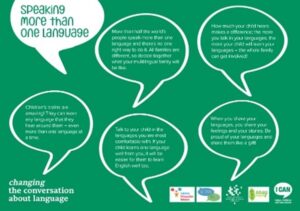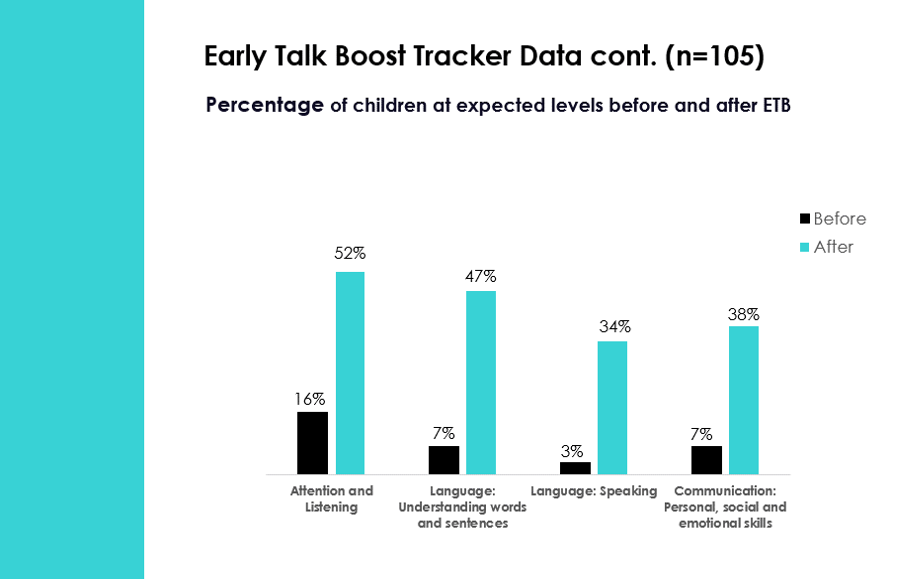How does Early Talk Boost help children that speak more than one language?
Find out how our early language catch-up programme can help children with English as an additional language
A recently completed three-year project focused on our Early Talk Boost programme and children who speak more than one language, their families and early years staff.
Over three years, the project enabled us to:
- Review whether Early Talk Boost meets the needs of children (and their families) who speak more than one language.
- Evaluate if Early Talk Boost enables early years staff to support the development of English for children who speak more than one language and where there is also concern about the development of their home language skills.
- Update and create additional resources for our Early Talk Boost programme.
We were fortunate to work in partnership with a linguistically diverse group of families and early years staff. Languages included Pashto, Turkish, Luo, Lingala, Gujarati, Malayalam, Hindi and Russian.
What’s new?
The outcome of the work with families and early years staff resulted in us making changes and producing additional resources. Some examples that were made are listed below:
We’ve produced some short film clips with subtitles to share information with families and early years staff in an accessible way:
- What happens in Early Talk Boost sessions?
- What do practitioners think of Early Talk Boost?
- What does a parent think of Early Talk Boost?
- What do headteachers think of Early Talk Boost?
- Early Talk Boost: interviews
- How do we know that Early Talk Boost works?
- Can I share the books in my home language?
Revised English as an Additional Language key messages now feature in the staff training, the parent workshop and on the parent web page sending a clear message regarding the value of languages beyond English. 
An amended version of Tizzy’s Talking Tips in the staff training, parent workshop slides and in the Jake and Tizzy Books which encourages parents and carers to ‘Ask open-ended questions’ as open-ended questions help generate more language use.

We have reviewed the books with an aim of reducing the content and using accessible language. Secondly, to further support families with the type of open-ended questions they can ask during book-sharing, we have some examples of question prompts dotted around some pages.
Feedback from families told us that they were not sure what to expect when invited to the Parent Workshop. We have now added some information about the Early Talk Boost programme to the back of the Parent Workshop invitation. Due to feedback from early years staff, the parent workshop has now been simplified. There is one workshop with an option of three delivery methods (in person, online, or a recorded version that has guidance notes accompanying it).
What evidence do we have?
Below is some visual data relating to the progress of children that took part in the groups:


The randomised control trial (RCT)
We evaluated the revisions and impact through a small RCT:
- Four assessments were used and 42 children took part in the study.
- Half of the children took part in Early Talk Boost and half of them didn’t. Children were allocated to groups randomly.
- All the children did the same tests before and after the Early Talk Boost sessions and the results were compared.
The Early Talk Boost group showed more widespread change across communication measures than the waitlist group. However, changes were subtle, and some changes occurred for both groups. Children from families with lower education levels made more progress with Early Talk Boost.
The results showed that the Early Talk Boost programme seems to help children in some ways more than just going to nursery. Children in the programme got better at things like responding to others, understanding symbols, and thinking skills. Even though the changes aren’t huge, they’re still noticeable.
But it’s important to know that children who weren’t in the programme also got better at some of these things, just not as much. One reason we might not see a big difference between the two groups is that nursery staff might have shared some tips from the programme with everyone, even those not in it. Another reason could be that we didn’t wait long enough between tests to see all the changes.
This project enabled us to explore the accessibility of Early Talk Boost for early years staff and children who speak more than one language but, the changes are likely to benefit all families.
